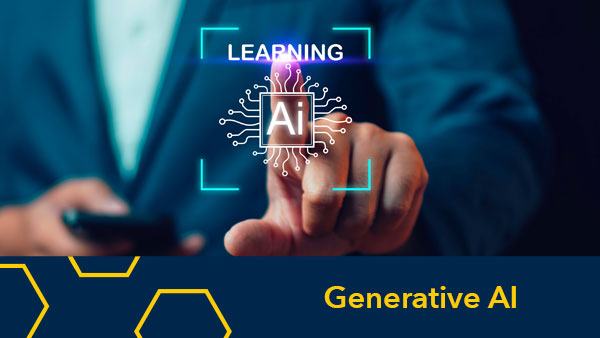
U-M experts discuss AI technologies, their ethical implications, and the potential impacts on businesses across industries in new short online course
Sean Corp, Content Strategist
As generative AI and large language models have gained a foothold in business practices across industries, the phrase “AI will not replace you, but the person using AI will” has become prolific among those who study business and AI’s potential impact on jobs.
A new short online course from the University of Michigan called “Generative AI Essentials: Overview and Impact” seeks to provide workers in any industry a fundamental understanding of how generative AI tools and large language models work, and how they are already changing our professional and everyday lives.

“AI literacy is as important to learn today as any skill, “said James DeVaney, associate vice provost for academic innovation and the founding executive director of the Center for Academic Innovation.”
“This course provides a perfect starting point for those learning about AI. We will introduce them to respected and trusted experts to discuss the technologies, their potential, and the ways AI will impact our work and our lives.”
Short Course Provides Foundational Knowledge
The open online short course brings together experts from across U-M to discuss how the tools work, the ethical use of artificial intelligence, implications for authorship, and what the rapidly evolving landscape of regulation might look like in the near term.
While most individual open online courses at U-M contain at least 10 hours of material, someone could complete the Generative AI Essentials short course in around three hours, the time one might allocate to a professional development workshop.

“AI is transforming the way we work, and we feel it is essential to create introductory courses allowing people to learn essential information in as little as an afternoon,” said Sarah Dysart, senior director of online learning at the center. “This course represents a first step in learning about AI and an important piece of our growing AI-related collection of learning opportunities.”
The course features 10 U-M professors and administrators representing the School of Information, Literature, Science, and the Arts, the Taubman College of Architecture and Urban Planning, the College of Engineering, the Stephen M. Ross School of Business, and the Law School.
There are five core sections: Introduction to Generative AI, Human Engagement with Generative AI, Ethical & Legal Implications, Impact on Society & Industry, and Impact on Business. Learners will hear from U-M experts throughout each section, engage in supplemental readings, and take assessments.
The course not only provides an overview of AI technologies, it also features practicing quality large language model prompts, how to cite AI-generated content appropriately, explores critical issues of data privacy, deep fakes, hallucinations, and emerging trends in how businesses are using generative AI to improve the bottom line.
Additional AI and Machine Learning Courses
“Justice and Equity in Technology Policy,” taught by the Gerald R. Ford School of Public Policy’s Shobita Parthasarathy, on how artificial intelligence can reinforce bias in policymaking, and how policymakers can take steps to ensure equity in public policy.
“Data Science Ethics,” taught by H.V. Jagadish of the College of Engineering, explores ethical considerations of collecting and managing big data.
“Introduction to Machine Learning in Sports Analytics,” part of the five-course series “Sports Performance Analytics.” It explores how athletic data and machine learning can be used to better predict athletic outcomes.
“Applied Machine Learning in Python,” part of the “Applied Data Science with Python” five-course series. Taught by Kevyn Collins-Thompson of the School of Information, it shows learners how to use Python to create and evaluate data clusters and build predictive models.
To explore U-M’s online learning opportunities, visit online.umich.edu. To enroll in the “Generative AI Essentials: Overview and Impact” course, visit the course page on Michigan Online.


